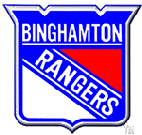|
|
|

|
Binghamton
Rangers |
|
1990
- 1997 |
|
American
Hockey League (AHL) |
|
Broome
County Veterans Memorial Arena |
|
10 Years Later: 1992-93 Binghamton Rangers
The AHL.com
Thursday, April 3, 2003
For one regular season, they were the most dominating team in AHL history. But 10 years later, the Binghamton Rangers' 57-win performance is still just a footnote in Calder Cup annals.
Following two successful campaigns, recording 44 wins and 94 points under John Paddock and then winning the Southern Division title with 41 wins and 91 points under Ron Smith, the Rangers raced out to a 5-0-3 start in 1992-93, establishing themselves quickly as an offensive powerhouse. Wins kept piling up -- and big wins, too: 9-2, 8-5, 7-3. By the end of November, Binghamton was 20-2-3, a remarkable .860 winning percentage.
The Rangers thrashed Providence, 11-3, in their last game before Christmas. During an unbeaten January, they outscored their opponents by a margin of 56-14. They smoked Hershey, 8-1. They beat Baltimore on back-to-back nights, 6-1 and 6-2. They pummeled their arch-rivals from Rochester, 10-1. All this and a coaching change, too, as Smith was promoted to New York during the first week of January and was replaced in Binghamton by assistant Colin Campbell. The offense was rolling, the defense was jelling, and the goaltending was rock-solid, thanks to much-touted 20-year-old rookie Corey Hirsch.
Fresh off a Memorial Cup championship with Kamloops in 1992, Hirsch came to Binghamton after winning 153 regular-season and playoff games in four junior seasons. He would post an incredible record of 35-4-5 in Binghamton, leading the league in wins and goals against average, earning a berth on the First All-Star Team and winning the Dudley ãRedä Garrett Award as the AHL's outstanding rookie.
Hirsch wasn't the only young stud in the Rangers' system. The parent club in New York was beginning to develop a pair of Russian players who were making their North American debuts in 1992-93. Shuttling between the Big Apple and Binghamton throughout the year were 19-year-old forward Alexei Kovalev and 22-year-old defenseman Sergei Zubov. Both were highly-skilled, if not a little rough around the edges. Kovalev played 13 regular-season games in Binghamton, and tallied 13 goals and 11 assists. Zubov suited up for 30 AHL contests, and registered seven goals, 29 assists and a phenomenal plus-31 rating. A year later, both would be integral parts of New York's first Stanley Cup championship in 54 years.
The rest of Binghamton's roster was mainly stocked with veterans and role players, but the stars were aligned in 1992-93 and almost everyone put together a career year:
Forward Don Biggs, an eighth-year pro who was an important piece of the Hershey Bears' Calder Cup championship team in 1988, would earn league MVP honors with 54 goals and an AHL-record 138 points.
Brian McReynolds (100 pts.) and Craig Duncanson (94 pts.) surpassed their next-best career outputs by at least 25 points each.
Mike Stevens, who ranks sixth on the AHL's all-time penalty minutes list, set personal highs with 61 assists and 92 points.
Rookie defenseman Joby Messier, a cousin of New York Rangers captain Mark Messier, posted a plus-59 rating in 60 games, an AHL record.
The first bump in the road came on Feb. 6, when the Hamilton Canucks earned a 4-3 overtime win, ending Binghamton's AHL record-tying 17-game home winning streak and a 21-game home unbeaten streak, sending the Rangers to their first home loss of the year. Binghamton responded with an eight-game tear to improve to 42-6-8, and on Feb. 24, with two dozen games and more than six weeks still left in the season, the Rangers clinched a Calder Cup Playoff berth.
Three years earlier, local AHL fans were staggering through the Binghamton Whalers' miserable 11-60-9 season, the most inept campaign in league history. Now, the Rangers were making a push toward the top of the mountain, and records kept falling in their path. A 13-game unbeaten streak -- their third such run of the season -- improved Binghamton's record up to 56-10-9 with five games to play.
That's when the wheels starting falling off the Rangers' wagon. An 8-3 loss to Providence on Apr. 7, a 7-3 loss to Hamilton on Apr. 11. Following the season finale on Apr. 13, a 5-3 loss in Rochester, the 1992-93 Rangers still had more wins (57), fewer losses (13) and more points (124) and a better winning percentage (.775) than any team in AHL history, but suddenly playoff success wasn't such a foregone conclusion.
In the Southern Division semifinals, the Rangers drew the Baltimore Skipjacks, who went 28-40-12 (including 0-8-2 against Binghamton) and finished 56 points back in the division standings. But Baltimore, behind players such as John Slaney, Jeff Nelson and Steve Poapst, put up quite a struggle, stealing Game 1 in Binghamton and eventually forcing the series to the limit with a 6-2 rout in Game 6. The Rangers prevailed with a 5-3 win in Game 7, but three days later, they were behind the eight-ball again, losing the opener of their division final series with Rochester.
This time, the Rangers ran out of gas. With a big lead and a chance to wrap up the series in Game 6, Binghamton let the Amerks hang around too long, and Rochester rallied for a 7-5 victory to force a Game 7, where a 3-2 victory on enemy ice propelled the Amerks to their third Calder Cup Final in four years. Despite a record of 64-20-10 since opening night, the Rangers' season was over.
The Binghamton Whalers played for the Calder Cup in the 1982 finals, but the city of Binghamton still talks about the 1992-93 Rangers as the closest they've come to a league championship. This year, John Paddock is back behind the Broome County bench, and the Binghamton Senators have had a successful inaugural campaign. In two months' time, they may be fitting the Arena rafters for a new banner after all.
|





